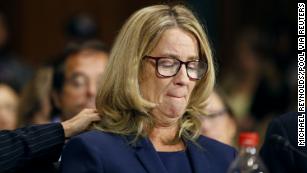Does the law hear women?
By Diane L. Rosenfeld
Updated 8:00 PM ET, Sat September 29, 2018
Diane L. Rosenfeld is a lecturer on law and director of the Gender Violence Program at Harvard Law School. She previously served as senior counsel to the Office on Violence Against Women at the Justice Department. The opinions expressed in this commentary are her own; View more opinion articles on CNN.
(CNN)Does the law hear women?
This week's dramatic -- and traumatic -- Senate hearing on Judge Brett Kavanaugh's nomination to the Supreme Court demonstrated that society and its leaders silence women, either with a hand over their mouth or by simply not listening to them.

Diane Rosenfeld
The details of the hearing illustrate how badly broken the system is in addressing sexual assault claims. Republican senators hired Rachel Mitchell, a sex-crimes prosecutor, to question -- or, let's be honest, cross-examine -- Christine Blasey Ford, Kavanaugh's alleged sexual assault victim, and, amazingly, no one blinked an eye. But why should a prosecutor cross-examine a victim? The prosecutor's role is to represent victims and to prosecute defendants. Wouldn't it have been more appropriate for a defense attorney or public defender to have questioned Ford?
This serious and insensitive error in judgment shows how far removed we are from the day when a sexual assault victim can achieve the justice they deserve, whether that means criminal repercussions for their abusers or the support of a society that refuses to stand for an alleged sexual offender as a Supreme Court justice.
As countless victims of sexual assault speak out in support of Ford's bravery, we must ask ourselves: How did we get to this point? And what changes to our legal system are necessary, in light of the #MeToo movement, for law to provide justice for women?
At the outset, it's important to note that women have no rights to challenge male sexual coercion and violence at the highest level of our judiciary: the Supreme Court. It is a little known fact that the high court struck down the civil right to be free from gender-motivated violence in US v. Morrison in 2000 and then struck down an abused woman's right to enforcement of an order of protection in Castle Rock v. Gonzales in 2005. In both cases, the court overturned democratically achieved legislation passed in response to women demanding equal protection of the law-- meaning protection from sexual and domestic violence.
In 1994, after four years of hearing testimony, Congress passed the Violence Against Women Act (VAWA). It provided, among other provisions, a federal civil right to be free from gender-motivated violence. In other words, women, for the first time, could seek justice and civil damages for crimes committed against them because of their gender. It gave women the right to pursue these cases on their own, rather than relying on prosecutors like Rachel Mitchell. States overwhelmingly supported the legislation as it helped them to address gender bias in their own courts.
Then came the case of US v. Morrison, which involved facts disturbingly reminiscent of Dr. Ford's claims against Brett Kavanaugh and Mark Judge. The case alleged that two Virginia Tech football players raped a freshman woman a half hour after meeting her, even though one of the men admitted that she had said "no" at least twice.
One of the players, Antonio Morrison, had announced publicly in the school dining hall that he "liked to get girls drunk and f**k the s**t out of them." This was, in fact, recognized by the Supreme Court as gender-based animus in violation of the Violence Against Women Act. But the court struck down the civil rights provision (that is, the section of the Violence Against Women Act that gave women the right to sue their attackers in federal court) by a 5-4 decision, finding that violence against women was outside the purview of Congress to regulate in the first place.
The justices held it was insufficiently related to interstate commerce, meaning it did not affect the national economy in any significant way. But as the dissent pointed out, this ruling disregarded substantial evidence from Congress about the significant impact that violence against women has on the economy in lost wages, hospital costs, fear of travel in interstate commerce and other negative effects suffered by victims. Moreover, Supreme Court precedent for generations had recognized that deprivation of civil rights did indeed impact interstate commerce.
Though the ruling may have hinged on the details of the Commerce Clause, it is fair to ask whether this was merely a justification for denying women their civil rights. In fact, Chief Justice William Rehnquist had, in 1991, publicly opposed the civil rights remedy, claiming that women would misuse it to gain advantage in their domestic relations cases, crowding the federal docket with their claims.
As if Morrison was not enough to send women the message that they have no right to access justice, the high court dealt another blow in Town of Castle Rock v. Gonzales in 2005. In that case, Jessica Gonzales had pleaded with the Castle Rock police over the course of several hours to arrest her estranged husband, who had kidnapped their three daughters from her front lawn in violation of a restraining order she had against him. The police refused, even though at one point she gave them his exact location. Tragically, he murdered the girls with a gun he purchased that night. The court struck down her complaint against the police -- and a woman's right to police assistance in the enforcement of a restraining order.
In Morrison, the court slammed the doors of the federal courthouse in the face of women seeking legal recourse for gender-based violence. The message: Violence against women is unfortunate, but certainly not a matter important enough to establish a "federal case."
In Castle Rock, Justice Antonin Scalia, usually a strong proponent of state's rights, overruled state legislation passed specifically to protect women. Here we have the Wizard of Oz scarecrow pointing in different directions: Morrison suggested that with no federal jurisdiction for violence against women, perhaps the state might help; Castle Rock pointed elsewhere, saying the state could not have meant to limit police discretion to ignore a woman's cries for help.
So regardless of whether Judge Kavanaugh is confirmed, the big question is, where are women to go? The answer? Back to the core principle of the #MeToo movement, which means supporting one another in coming forward with our claims.
This week, we saw the incredibly powerful and truly validating experience that organically takes hold for millions of women when a survivor like Ford comes forward and tells the truth. We need to know that our experience is evidence and that our word is testimony. We may have taken a small and tentative step in that direction when Jeff Flake, the Republican senator from Arizona, was clearly moved, by both Ford's testimony and his confrontation in an elevator with two sexual assault survivors, to demand an FBI investigation into the sexual assault allegations of women who attest that Brett Kavanaugh is unfit for judicial office.
Once the Kavanaugh nomination is finally settled, we need Senate hearings on law in the #MeToo era. We need big changes -- even a complete overhaul. And senators on the Judiciary Committee must hear directly from women on this, just as Sen. Flake did in the elevator. But, unlike the sad story of the Violence Against Women Act, which was essentially gutted in the Morrison case, this time let's prevent the Supreme Court from ever again silencing our voices.
















No comments:
Post a Comment